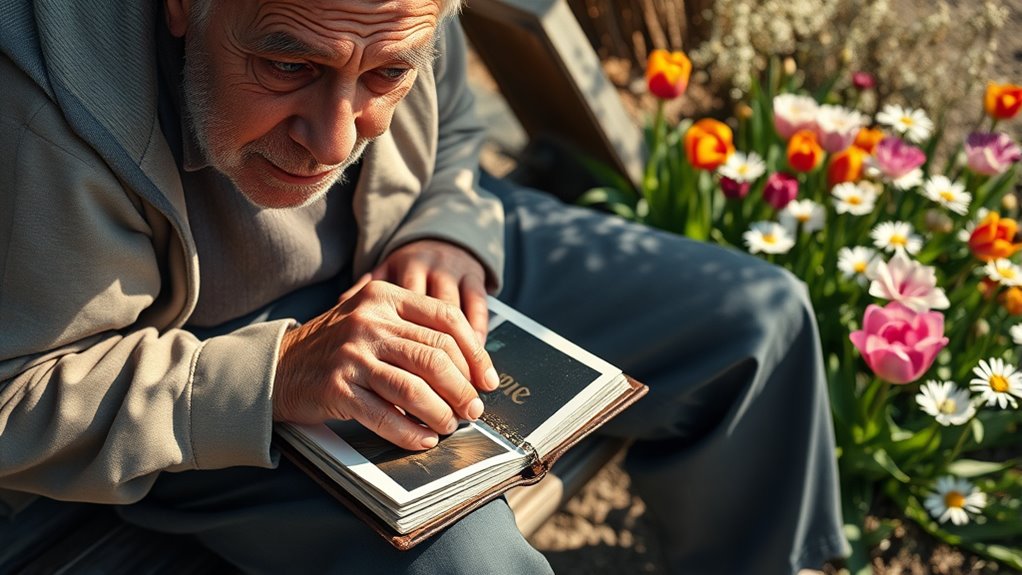When your grandfather has BPD, you can keep your bond strong by setting gentle boundaries that protect your emotional space and prevent chaos. Practice empathy by understanding that his reactions stem from inner pain, not personal attacks. Show consistent love and patience, especially during calm moments, to build trust. Seek to learn about BPD and consider professional support to handle challenging behaviors. If you stay compassionate and boundaries-aware, you’ll discover ways to nurture your relationship despite the difficulties.
Key Takeaways
- Establish clear boundaries to prevent emotional overwhelm and maintain a stable, respectful relationship with your grandfather.
- Practice patience and empathy, recognizing his behaviors stem from emotional pain rather than intentional actions.
- Educate yourself about BPD to respond compassionately and reduce frustration during challenging interactions.
- Encourage professional support for your grandfather and seek family or support groups for guidance and shared strategies.
- Focus on love, consistency, and positive interactions to foster trust and reduce chaos in your relationship.

Have you ever wondered what it’s like to have a loved one with borderline personality disorder (BPD)? If your grandfather has BPD, you might feel caught between wanting to support him and managing the chaos that often comes with his mood swings. It can be confusing to navigate a relationship with someone whose emotions shift rapidly, especially when that person is an elder you respect and love. You might find yourself walking on eggshells, trying to avoid triggering his intense reactions, while also wishing for a calmer connection. Understanding that BPD is a mental health condition rooted in deep-seated fears of abandonment and emotional pain can help you develop compassion rather than frustration. Your grandfather’s unpredictable behavior isn’t intentional; it’s a reflection of his inner struggles.
You can start by setting healthy boundaries. This doesn’t mean shutting him out but rather protecting your emotional well-being. For example, if he tends to lash out during certain topics or situations, gently steer conversations away or suggest taking a break. Maintaining boundaries helps prevent his mood swings from overwhelming you and preserves your own mental health. At the same time, show empathy and patience. Remember that his intense reactions are manifestations of his pain, not personal attacks. When he’s calmer, try to engage in meaningful conversations, expressing your concern and love without judgment. Reinforce that you’re there for him, which can help foster a sense of safety and trust, even during difficult times. Additionally, understanding emotional regulation strategies can be beneficial in managing these interactions effectively.
Set boundaries with patience and empathy to protect your well-being and foster trust.
It’s also beneficial to educate yourself about BPD. The more you understand the disorder, the less you’ll feel overwhelmed by his behaviors. This knowledge can guide you in responding effectively and compassionately, reducing misunderstandings. Encourage him to seek professional help if he’s open to it, as therapy can provide him with tools to manage his emotions better. Support groups for families affected by BPD can also offer you a sense of community and tips from others in similar situations. Remember, it’s okay to seek support for yourself too. Caring for a loved one with BPD can be draining, and taking time to care for your own mental health isn’t selfish—it’s necessary.
Ultimately, maintaining a bond with your grandfather involves patience, understanding, and boundaries. By approaching his BPD with compassion and realistic expectations, you can foster a relationship rooted in love rather than chaos. It takes effort, but your presence and support can make a significant difference in his life, helping him feel less alone in his struggles.
Frequently Asked Questions
How Can I Protect Myself Emotionally Around a Grandfather With BPD?
You can protect yourself emotionally by setting clear boundaries and sticking to them. Don’t take everything personally; remember his reactions stem from BPD, not you. Practice self-care and seek support from friends or a therapist to process your feelings. Stay calm during intense moments, avoid engaging in heated conversations, and prioritize your well-being. By maintaining boundaries and self-awareness, you can nurture your relationship without sacrificing your emotional health.
Are There Specific Communication Strategies for Dealing With BPD Behaviors?
You can navigate BPD behaviors by setting clear boundaries and staying calm. Ironically, the more you try to “fix” things, the more chaos might unfold. Use “I” statements to express your feelings without blame, and listen actively to show you care. Keep your tone steady and avoid reacting emotionally—this helps de-escalate conflicts and keeps communication respectful, even during intense moments.
What Are Warning Signs of a BPD Crisis in Older Adults?
You might notice sudden intense mood swings, feelings of emptiness, or difficulty controlling anger. Watch for rapid shifts in behavior, impulsive actions, or a sense of paranoia or dissociation. If your grandfather becomes unusually withdrawn or overly reactive, these could signal a crisis. Pay close attention to his expressions of hopelessness or fear. Recognizing these signs early helps you respond calmly and seek support, preventing escalation.
How Does BPD Affect a Grandfather’s Long-Term Relationships?
You might notice that BPD can make your grandfather’s long-term relationships fluctuate, with about 75% of adults with BPD experiencing relationship difficulties. His intense emotions and fear of abandonment could lead to conflicts or distancing. To maintain bonds, you should communicate openly, show consistency, and set healthy boundaries. Understanding his emotional needs helps you stay connected without chaos, fostering trust and stability over time.
Can Therapy Help Improve a Grandfather’s BPD Symptoms Over Time?
Yes, therapy can help improve your grandfather’s BPD symptoms over time. It provides him with tools to manage emotional instability, improve relationships, and develop healthier coping strategies. Consistent therapy sessions, especially Dialectical Behavior Therapy (DBT), can reduce impulsive behaviors and emotional pain. Encourage him to stay committed, as progress is gradual, but with support, he can experience better emotional regulation and stronger bonds with family members.
Conclusion
Navigating your grandfather’s BPD is like steering through a stormy sea—challenging yet steering through with patience and compassion. By holding onto the anchor of understanding, you keep the bond steady amid turbulent waves. Remember, his love is a fragile glass sculpture—beautiful but delicate. With gentle care and steady hands, you can preserve the masterpiece of your relationship, turning chaos into a canvas of resilience and hope that shines brighter than any storm.









